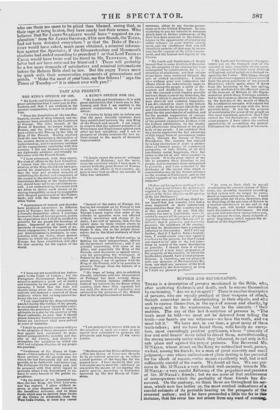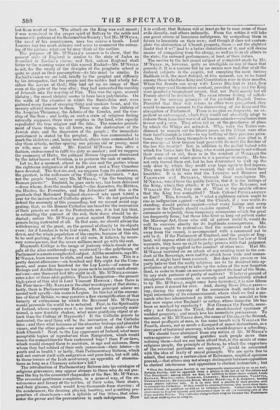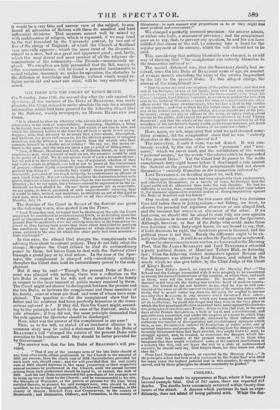REFORM AND REFORMATION.
THERE is a description of persons mentioned in the Bible, who, after scattering firebrands and death, seek to excuse themselves by exclaiming, "Are we not in sport ?" There is another description of persons, who are equally prodigal of their weapons of attack, though somewhat more discriminating in their objects, and wha seek to excuse themselves, in the eyes of reason and charity, by an appeal, not to the wantonness, but to the sincerity cf the motives. The cry of this last description of persons is, "The truth must be told—we must not be deterred from telling the truth—our hearts are our witnesses—we love the truth, and we must tell it." We have met, in our time, a great many of these truth-tellers ; and we have found them, with hardly an excep- tion, most exceedingly prudent gentlemen, whose "sincerity of fear and cold hearts" never failed to direct them, notwithstanding the strong necessity under which they laboured, to rail only in the safe place and against the proper persons. The Reverend Mr- 1116NEILE, whose attack on the King we noticed last week, passes, we find, among his friends, for a man of great sincerity and small judgment,—one whose enthusiasm of plain-dealing is too powerful for the check of reason, —who means excellently well, but is not sufficiently careful of his words. We doubt all this. We can per- ceive in Mr. M`NEILE a very decided well-meaning towards Mr. 111'NEILE—a very careful flattering of the prejudices and passions of Mr. APNEILE'S friends ; but we see none of that recklessness of consequences which the partiality of those friends has dis- covered. On the contrary, we think there are throughout his ser- mon, which now lies before us, the most marked indications of careful estimate of its probable bearing on the prospects of the reverend author; and if he have proceeded a little too far in this instance, that his error has not arisen from any want of cunning,
but from want of tact. 'The attack on the King was well meant; it was conceived in the proper spirit of flattery to the noble and honouralAst patrons of the Reformation Society ; but Mr. Wilma% like most of his countrymen, uses too coarse a brush. Lord LORTON has too much delicacy and sense to commend the colour- mg of the picture, whatever he may think of the outline. The purpose of Mr. APNEiee's sermon is to show, that the present state of England is similar to the state of Judea as described in Ezekiel's vision; and that, unless England shall listen to the warning voice of this second Ezekiel—Mr. M`NEILE to wit, for the vanity of the disciples of the prophetic school is quite as great as their presumption—its fate must be similar. In Ezekiel's vision we are told, briefly by the prophet and diffusely by his interpreter, that the people and the nobles had wholly for- saken the service of God ; they had set up an image of Baal even at the gate of the true altar ; they had converted the worship of Jehovah into the worship of Fire. This was the open, avowed idolatry ; the secret idolatry seems to have been polytheistic. On the walls of the chamber in which the Sanhedrim met, were pictured every form of creeping thing and unclean beast, and the seventy offered incense to them. There was also the idolatry of the Assyrian Thammuz, the Adonis of the Greeks, and the wor- ship of the Sun ; and lastly, as such a state of religious feeling naturally supposes, there were sceptics in the land, who equally repudiated the true religion arid the false. The remoter punish- ment of these things, we all know, was the destruction of the Jewish state and the dispersion of the people ; the immediate punishment is stated by the prophet. He was commanded to mark the idolaters ; and, being marked, others were commanded to slay them utterly, neither sparing nor pitying old or young, maid
or wife, man or child. Mr. Ezekiel M'NELLE has, after a fashion, endeavoured to fulfil his duty as marker ; and we suppose the yeomanry of Hens, the political Novunz Organ= discovered by the latter house of Verulam, is to perform the task of smiters. Let us, for a moment, attend to the sins and the parties whom the righteous indignation of an Irish priest and a Tory Countess have devoted. The first sin, and, we suppose from its prominence, the greatest, is the sufferance of the College of Maynooth. "Are not the people taxed," says Mr. M`NEILE, "for the teaching of Roman priests ?" England, he goes on to say, has been delivered —from whom, does the reader think?—the Amorites, the Hittites, the Hivites, the Perrezites, and the Jebusites! and this is the gratitude that Reformed England shows—it sets apart 9,0001. a year for the instruction of Catholic priests. We do not pretend to defend the enormity of this proceeding, but we cannot avoid sug- gesting, that, as the Roman Catholics are taxed for the instruction of their priests as well as the Protestants are, it is but fair that, in estimating the amount of the evil, their share should be de- ducted; unless Mr. MVEILE protest against Roman Catholic priests being instructed at all. In that case, we should advise the withdrawing of the grant, on the ground of charity to its objects even ; for if London is to be laid waste, St. Paul's to be knocked down, and the whole population of the empire, because of this sin, to be sent packing, as the Jews of old were, it follows, by neces- sary consequence, that the seven millions must go with the rest. Maynooth College is the image of jealousy which stands at the gate of the altar northward—(qy. westward ?)—the polytheism of Parliament is a more complicated subject. All the members, says Mr. M`NEILE, burn incense to idols, and each has his own. This is a pretty decent allowance—six hundred and fifty-eight for the Com- mons, and some four hundred for the Lay Lords—of course the Bishops and Archbishops are too pious men to imitate such abomi- nations—one thousand and fifty-eight in all. Mr. 11.I.Nniaa enume- rates a few of these idohtpolitica. There is Emigration—the present high-priest of this idol is Lord Viscount Howicx ; then there is the Poorelaws—Mr. SADLER is the chief worshipper at that shrine ; lastly, there is Parliamentary Reform, whose principal adorer we cannot well specify—his name is Legion. In this list of the enormi- ties of Great Britain, we may perceive a fine exemplification of that honesty of enthusiasm by which the Reverend Mr. WNEILE would persuade the world he is actuated. First, to the Spirituality of Ireland, whose empire over it, so long and so rigorously main- tained, is now fearfully shaken, what more gratifying object of at- tack than the College of Maynooth? If the Catholic priests be instructed, the next thing will be the instruction of the Catholic laics ; and then what becomes of the absentee bishops and pluralist Vicars, and the other gods—we must not call them idols—of the Irish Church ? Next, to the Lay oppressors of Ireland, what more acceptable topics of reprobation than Emigration, which would lessen the competition for their rackrented bogs ? than Peor-laws, which would compel them to maintain, in age and sickness, those whom they had robbed of their only possession—their labour—in youth and in health ? or lastly, than Parliamentary Reform, which will not content itself with emigration and poor-laws, but will add, to those terrors of the Irish aristocracy, an appendix of abomina- tions as long as a Chancery solicitor's bill? The introduction of Parliamentary Reform into his catalogue of religious grievances, may appear strange to those who do not pos- sess the key to the connected rhapsodies of the Rev. Mr.11•I`NnieE. The reverend gentleman complains, in a general way, of the co- vetousness and luxury of the nobles, of their sofas, their .chairs, and their glasses, which would keep thousands from starving ; of the carelessness, the dancing. pia) ing. hunting, and gambling pro- pensities of churchmen—not a syllable of the tithes, that admi- nister the power and the provocatives to such indulgences. Now it is evident, that Reform will at least go far to cure some of those evils directly, and others indirectly. From the nobles it will take one great source of luxurious indulgence, by compelline, them in future to luxuriate on their own; and though it does not contem- plate the abstraction of Church property, there not the slightest
doubt that it wi'l lead to a better distribution of it, and will devise means of compelling from the clergy, as well as from all others in the state, the outward performance, at least, of their duties.
The motive to the last grand subject of complaint made by Mr. M`NEILE, is, however, quite as intelligible as any of those that
precede it. It is a curious but by no means new fact, that of all the disloyal subjects in the empire, not excepting the most furious Radicals in it, the most disloyal, at this moment, are to be found among those who have King and Constitution ever in their mouths.
When the Jesuits ran away with Louis Dix-huit in 1814, they openly expressed themselves content, provided they and the King were granted a triumphant return, that not Pais merely but all
France should be desolated. The same intense teethe', of selfish- nessis the moving principle of the excluded English Tories.
Provided that their safe return to office were guaranteed, they would to-moiTow consent to the discrowning of the King and the abrogation of Parliament. There is no plain so desperate, no ex- pedient so extravagant, which they would not cheerfully adopt to redeem them from that worst of all human miseries—exclusion from favour and pewer. They often tell us of the greediness of place
by which. the Whigs are actuated. Why, were the Tories con-
demned to remain out for fifteen years, as the Whigs were after their brief triumph in I 806—to say nothing of their previous priva- tions, they would hang themselves to a man, and save (that is, if the courage st their treason kept pace with its zeal) the finisher of the law the trouble! But, in addition to the peefect hatred with which the Tories hate the King, who would presume to act without
their counsel or aid, there is in the conduct of WILLIAM the Fourth an element which gives to it a peculiar int ensity. He has not only tinned them out, but he has determined to wall up the only door by which they could ever hope again to find ingress. They may knock till they are wearied, they will only bruise their knuckles. It is in vain that the LORTON'S and RODENS and FARNHAItIS and BEXLEYS, through their mouthpiece Mr. APNEILE, would have the public believe, that it is the failings of the King, which they attack ; it is 1,Viemasi the Reformer, not WILLIAM the Man, they aim at. What is the notable offence that the King has committed ? Made Colonel FITZCLARENCE an Earl! This, forsooth, is " what a righteous nation ought to rise in indignation against—what the Church, if it was worth its standing, should protest against—what every bishop and every pastor in the Church should exclaim against." We seek not to extenuate or tojustify those temporary- connexions which the great too frequently form; but those who have so long sat patient under the Marriage Act, those who still sit patient under it, would do well to exercise charity for its legitimate consequences. Mr. MNEILE ought to remember, that the commend not to take away from the record, is accompanied with a command not to add to it. If the Parliament of England, and the people of Eng- land, will impose other obligations on princes than the law of God warrants, they have no right to judge princes with that judgment which is properly applied to the conduct of other men. Had Mr. NPNEILE ventured on an attack of any existing error in the con- duct of the Sovereign, even had the attack been rude and unman- nered, it might have been excused. But does this person or his party believe that the really religious are to be deceived into ap- probation of an attempt to rake up the ashes of the now forgotten dead, in order to frame an accusation against the head of the State, by any stale pretence of purity of motives? Whatever ground of inculpation the connexion, so coarsely and uncharitably alluded to by Mr. M`NEiee, might once have furnished, it is now fifteen years since it ceased for ever. And, during those fifteen years— nay, during the currency of the connexion itself, unless in the legal informality of its commencement, where shall we find a mo- narch who has administered so little occasion to scandal as him that now reigns over Eneland? or rather, whose-domestic life has been so marked by regularity ? Not GEORGE the Fourth, assur- edly ' • not GEORGE the Third, that much-boasted specimen of wedded propriety ; and much less his immediate predecessor. To mention, as Mr. WNEILE does, the name of Cueliees the Second, the most profligate of men, in the same breath w:th WILLIAM the Fourth, shows, not so much a disregard of moral distinctions, as a disregard of historical accuracy, which woulddisgrace a schoolboy. We should have abstained from any notice, 01. Mr. M`Nmea's extravagances—for nothing gratifies such people more than noticing them—had we not been afraid that, in the minds of some religious people' the principle of Reform, to which the supporters of the reverend gentleman are opposed,* ehould be associated with the idea of laxity of moral principle. We are quite free to admit, that among a certain class of Reformers, sceptical opinions prevail,—that others may not always distinguish between opposition to clerical intolerance and opposition to clerical instruction ; but
• That the Reformation Society is not improperly represented by us as an Anti- Reform Society, will be apparent from a glance at the listof its Presidents and Vice-Presidents ,• among whom we find, in addition to those above named, Lords
BARHAM, MOUNTCASEEL, GAMBIER, GARBERY, MOUNTSANFORD, VALENTIA, GOOLMONDELEV, Sir GEORGE ROSE, HENRY MAXWELL, J. E. Gonvost, besides many others inferiore flout. It is in vain that a society of such persons seek- to convert the Catholics. If they would be esteemed sincere, they must show. them- selves friends to political as well as to religious liberty. Catholicism in Ireland owes more to Eng.imb tyranny and intolerance than to all the fostering care of the Pope and the Priests. The Catholics clung to their religion because the Protestants left them nothing else to cling to.
it would be a very false and narrow view of the subject, to con. found all advocates of Reform with these its smallest and least influential divisions. That measure cannot well be mixed up with recklessness of religion, which is espoused, if we may trust to the test furnished by the University contest, by two out of five of the clergy of England; of which the Church of Scotland very generally approve ; which the more strict of the dissenters, almost to a man, hail as a great and important good ; and, lastly, which the most decent and most prudent of all the religious de- oominations of the community—the Friends—unanimously ap- plaud. We ourselves are fully persuaded that the Bill, among its other recommendations. will be found a powerful handmaiden to sound religion, inasmuch as, under its operation, the obstacles to the diffusion of knowledge and liberty, without which sound re- ligion never did and never can exist, will be very materially les- sened.




























 Previous page
Previous page